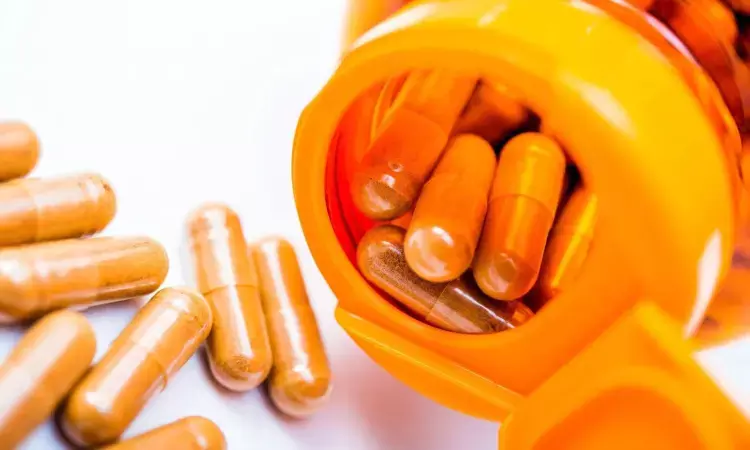- Home
- Medical news & Guidelines
- Anesthesiology
- Cardiology and CTVS
- Critical Care
- Dentistry
- Dermatology
- Diabetes and Endocrinology
- ENT
- Gastroenterology
- Medicine
- Nephrology
- Neurology
- Obstretics-Gynaecology
- Oncology
- Ophthalmology
- Orthopaedics
- Pediatrics-Neonatology
- Psychiatry
- Pulmonology
- Radiology
- Surgery
- Urology
- Laboratory Medicine
- Diet
- Nursing
- Paramedical
- Physiotherapy
- Health news
- Fact Check
- Bone Health Fact Check
- Brain Health Fact Check
- Cancer Related Fact Check
- Child Care Fact Check
- Dental and oral health fact check
- Diabetes and metabolic health fact check
- Diet and Nutrition Fact Check
- Eye and ENT Care Fact Check
- Fitness fact check
- Gut health fact check
- Heart health fact check
- Kidney health fact check
- Medical education fact check
- Men's health fact check
- Respiratory fact check
- Skin and hair care fact check
- Vaccine and Immunization fact check
- Women's health fact check
- AYUSH
- State News
- Andaman and Nicobar Islands
- Andhra Pradesh
- Arunachal Pradesh
- Assam
- Bihar
- Chandigarh
- Chattisgarh
- Dadra and Nagar Haveli
- Daman and Diu
- Delhi
- Goa
- Gujarat
- Haryana
- Himachal Pradesh
- Jammu & Kashmir
- Jharkhand
- Karnataka
- Kerala
- Ladakh
- Lakshadweep
- Madhya Pradesh
- Maharashtra
- Manipur
- Meghalaya
- Mizoram
- Nagaland
- Odisha
- Puducherry
- Punjab
- Rajasthan
- Sikkim
- Tamil Nadu
- Telangana
- Tripura
- Uttar Pradesh
- Uttrakhand
- West Bengal
- Medical Education
- Industry
Cinnamon supplements lower blood sugar concentrations during CGM in prediabetics

USA: Cinnamon, a low-cost and widely available supplement, may lead to better glucose control when added to the diet in people with obesity-related prediabetes, a recent study published in The American Journal of Clinical Nutrition has shown.
The study using a 12-week-long randomized, controlled, double-blind, crossover trial revealed that daily intake of just 4 g of cinnamon supplements over four weeks significantly reduced blood glucose concentrations in overweight and obese prediabetic individuals.
Cinnamon is a spice obtained from the inner bark of various Cinnamomum genus tree species. Out of more than 250 species belonging to the genus, only four are harvested commercially. Traditionally, cinnamon has been used in several global cultures as an aromatic spice and, less often, as an anti-inflammatory, antimicrobial, and food-preserving agent. Previous clinical studies have demonstrated that cinnamon spice lowers blood glucose concentrations, but the results have been inconsistent.
Hila Zelicha, University of California, Los Angeles, Los Angeles, CA, United States, and colleagues aimed to determine the effect of daily cinnamon spice supplementation in an amount commonly used for seasoning on glucose concentrations in adults with obesity and prediabetes.
Following a 2-wk run-in period of a low polyphenol/fibre diet maintenance, 18 participants with prediabetes and obesity underwent a 10-week randomized, controlled, double-blind, crossover trial (mean age 51.1 years; mean fasting plasma glucose 102.9 mg/dL).
The participants were randomly assigned to cinnamon (4 g/d) or placebo for 4 weeks, followed by a 2-week washout period, and then crossed over to the other intervention for an additional 4 weeks. Continuous glucose monitoring was used to measure glucose changes. Oral glucose tolerance testing was performed immediately following ingestion of cinnamon or placebo at 4-time points to evaluate their acute effects at the baseline and end of each intervention phase. Digestive symptom logs were obtained daily.
In the research study, cinnamon was encapsulated to achieve accurate dosing, compliance, and blinding. However, the researchers note that the 4 g cinnamon doses used in the study, which equates to the contents of a typical sugar packet, can easily be incorporated into foods.
The researchers reported the following findings:
- There were 694 follow-up days with 66,624 glucose observations.
- 24-h glucose concentrations were significantly lower when cinnamon was administered [mixed-models; effect size (ES) = 0.96] versus placebo.
- The mean net-area-under-the-curve (netAUC) for glucose was significantly lower than for placebo when cinnamon was given (over 24 h; ES = –0.66).
- Cinnamon supplementation led to lower glucose peaks compared with placebo (Δpeak 9.56 ± 9.1 mg/dL compared with 11.73 ± 8.0 mg/dL; ES = –0.57).
- There was an increase in glucose-dependent-insulinotropic-polypeptide concentrations during oral glucose tolerance testing + cinnamon testing (mixed-models; ES = 0.51), whereas triglyceride concentrations decreased (mixed-models; ES = 0.55).
- Treatment adherence was excellent in both groups (cinnamon: 97.6 ± 3.4 % compared with placebo: 97.9 ± 3.7 %; ES = –0.15).
- No differences were found in digestive symptoms (borborygmi, abdominal pain, bloating, excess flatus, and stools/day) between the cinnamon and placebo groups.
"Our findings suggest that adding cinnamon, a substance naturally rich in polyphenols, to daily diets may impart beneficial glycemic effects in prediabetes," the research team concluded.
Reference:
Zelicha H, Yang J, Henning SM, Huang J, Lee RP, Thames G, Livingston EH, Heber D, Li Z. Effect of cinnamon spice on continuously monitored glycemic response in adults with prediabetes: a 4-week randomized controlled crossover trial. Am J Clin Nutr. 2024 Jan 26:S0002-9165(24)00008-X. doi: 10.1016/j.ajcnut.2024.01.008. Epub ahead of print. PMID: 38290699.
Dr Kamal Kant Kohli-MBBS, DTCD- a chest specialist with more than 30 years of practice and a flair for writing clinical articles, Dr Kamal Kant Kohli joined Medical Dialogues as a Chief Editor of Medical News. Besides writing articles, as an editor, he proofreads and verifies all the medical content published on Medical Dialogues including those coming from journals, studies,medical conferences,guidelines etc. Email: drkohli@medicaldialogues.in. Contact no. 011-43720751


